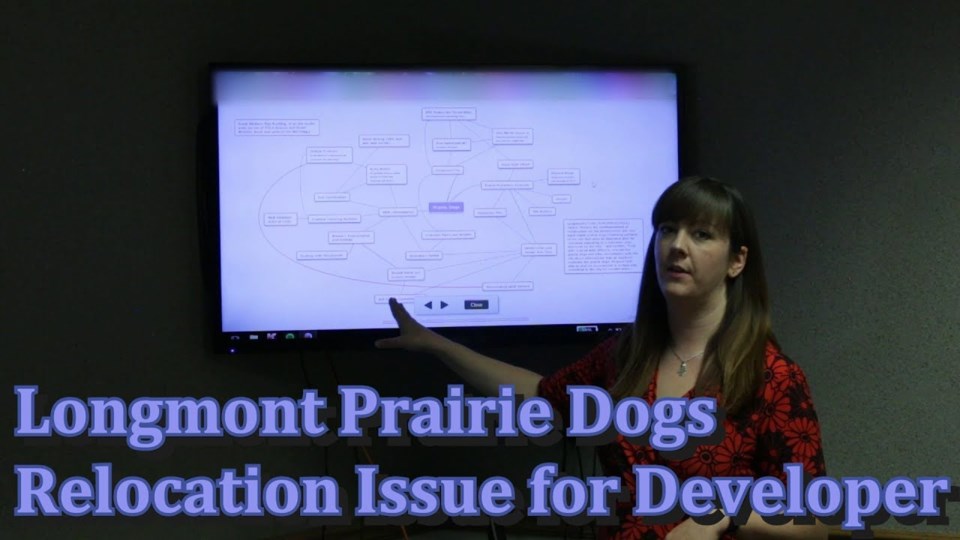This content was originally published by the Longmont Observer and is licensed under a Creative Commons license.
Written and Reported by Lizzy Rogers
Video Directed and Edited by Matt Steininger
The Longmont Observer has been following the story of the prairie dogs, who reside at the soon to be developed Great Western Flex Building on the east side of Longmont. What seems, at first, to be a simple tale of animal rights campaigners versus the developers, has drawn out into an illustration of the effects of city codes, how they are (or are not) followed and the large number of people, organizations and businesses involved in just one small part of a new development.
In this video and article, we try to explain the key players, their connections to each other and the rough outline of how the events are unfolding.
The development started when the Longmont based business Creative Learning Systems (CLS) learned that they need to find a new location due to the plans to reroute the St. Vrain river. The rerouting plan was made in response to the 2013 floods and subsequent plans to stop it happening again. The new path of the river will go through CLS's existing property. Longmont city wants to keep CLS local and so involved the developer, HSW Land LLC, and the Longmont Area Economics Partnership in helping CLS find a new location. The only land found suitable for their needs is on the east side of Longmont, on the southwest corners of Third Avenue and Great Western Drive, west of the Mill Village.
The land, owned by HSW, currently has a prairie dog colony living on it. According to Longmont city code, the animals need to be relocated. Before work can begin the relocation plan must be approved by the city. If HSW is unable to find anywhere to relocate the prairie dogs, they need to provide evidence of good faith efforts in looking for an alternative site for the animals before the city will allow the prairie dogs to be exterminated. This is where the non-profit group, Prairie Protection Colorado (PPC), steps in. They are advocating on behalf of the prairie dogs to make sure the developers do everything possible to relocate them.
HSW hired the environmental consultancy firm, Western Environment and Ecology to handle the efforts of finding a place to relocate the prairie dogs for them. They contacted a number of sites and counties to see if anyone would take the colony, but each declined. It was looking like a new home could not be found. Then PPC spoke to David Lucas, land manager at the Rocky Flats in Jefferson County. He is willing to give the animals a home at a soon-to-be-opened wildlife sanctuary, which needs more prairie dogs to encourage black-footed ferrets into the area. PPC was excited about this and encouraged HSW to submit a permit to Colorado Parks and Wildlife (CPW) for the relocation to be approved.
Instead of filing a permit, Western Environment and Ecology contacted Donald Davis, Jefferson county manager, who, in a letter made public, replied that county staff “would not recommend relocation of these destructive rodent pests from Boulder County to Jefferson County.” At the same time, PPC reports that Jessica Erickson, president of the Longmont Economic Development Partnership, emailed the neighboring land owners of the Rocky Flats to find out if they would be opposed to moving the prairie dogs to the land. The response was that they would object. Western Environment and Ecology forwarded the letters of Donald Davis and the neighboring land owners to Longmont city as proof of good faith efforts.
Despite persistent public pressure from PPC, Western Environment and Ecology have not submitted a permit to CPW for the relocation, and have instead focused on contacting the Jefferson county manager and surrounding land owners (through Jessica Erickson). This move comes after an email Western Environment and Ecology received from Colorado Parks and Wildlife District Wildlife Manager, Jason Duetsch, in which he stated that the CPW “would not support a relocation effort unless the following were attainable at the proposed site: 1) suitable habitat, 2) every neighboring landowner to the potential site had given written support, and 3) written support from the county commissioners.”
In an open email to Harold Dominguez, Longmont City Manager, PPC states, "Please insist that HSW Land submits a CPW application to relocate the Great Western Flex colony immediately. It is completely unacceptable that they continue to work towards the extermination of this colony and refuse to follow Longmont's own code and make a good faith effort to relocate these animals to a Wildlife Refuge that is willing to provide a new home for them. Only CPW can assess the viability of this relocation."
At the start of the process the city hired their own environmental consultants ERO Resources Corporation to assess the good faith effort and relocation plan. Ava Pecherzewski, the project planner with the city's planning and development departement has been collecting the information provided by both HSW and PPC which she then forwards to ERO. There has still been no announcement of a decision on the good faith effort from ERO or the city.
HSW had hoped to begin work on July 1st and a month later no development has begun. CLS needs to be in the building by February 2018 or they will have to look elsewhere for premises.
In emails from council members and city staff this Wednesday, August 2nd, there was a strong message that the city insisted that HSW submit a relocation permit to Colorado Parks and Wildlife before any kind of decision is reached.
The Longmont Observer is following this story and will bring you the latest updates as they happen.



